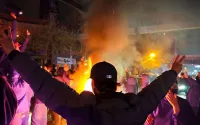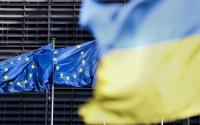The Guardian, 4 December, 2001Ariel Sharon's address to Israelis yesterday showed him apparently confident that he enjoys a new level of American support even as he condemned Yasser Arafat in terms so extreme they could prefigure the full-scale attack on the Palestinian Authority that Israel has always so far avoided. The gunships that raked Mr Arafat's Gaza helicopter pad yesterday could be a signal of worse to come, of a complete break with the Palestinian leadership, of the destruction of its infrastructure and of the dispersal and expulsion of its personnel. But it is impossible to believe that Mr Sharon has returned from Washington with an American mandate for such a course.
Certainly, the White House spokesman, answering questions after the Sharon speech, implied that Mr Arafat still has time to meet the requirements for stronger action against militants that President George Bush has laid down, and so did the Israeli deputy foreign minister. So the odds are that Israel will take military measures which will target buildings and areas connected with Hamas, Hizbollah and and Islamic Jihad and will also damage the Palestinian Authority, but will fall short of an all-out assault. The risks, in other words, may not be as great as they may appear in a first reading of Mr Sharon's speech, but they are real enough nevertheless. Chaos and a complete loss of control have never been nearer in the Middle East.
One of the reasons for this is that the policy of the United States after September 11 has produced a contest for American support, or, more accurately, a struggle between the Israeli government and the Palestinian Authority to push the other party into a position where it would bear the brunt of American pressure and displeasure, which has been literally lethal. Mr Arafat could have given in to those who have been urging him to devolve power to younger leaders, who could perhaps rein in attacks on the Israelis more effectively, but he has not done so, thinking that September 11 had handed him better cards and that he could muddle through. The Israelis could have helped him by dropping the impossible condition of a perfect ceasefire before any talks, but they preferred to let events develop in such a way as to enable them to paint him as an accomplice of terrorism, hoping to tip back the American tilt toward the Palestinians represented by Colin Powell's recent speech. The radical movements could have chosen to establish a red line between their methods and those of al-Qaida by reducing their operations, but they preferred, first, to obey the dictates of revenge and, second, to continue their successful upstaging of Mr Arafat by taking violent action while he tries and fails to get anything out of the Israelis by negotiations.
The radical Palestinian movements appear at first after September 11 to have decided on a continuation of the armed struggle, but not necessarily at the same level as in the past. However, one sure propellant of violence in Israel and the territories has always been the assassination of leaders. When the Israelis killed a senior Hamas figure just as the US peace envoy, General Anthony Zinni, began his work, they made it almost certain that there would be a response from Hamas. It may well be that Hamas would have staged suicide operations, at this time or later, whether or not a leader had been killed by the Israelis. But there must be a suspicion that some Israelis wanted General Zinni to have a first hand view of terrorism, which might then shift the view of Mr Arafat in Washington. The Bush administration's reaction to the bombings has indeed been to demand that Mr Arafat act to suppress the radical movements and to detain their top people, and Mr Arafat has already made a considerable number of arrests, risking his weakening political position by doing so. Whatever it feels it has to say in public, the United States must make it clear in private that it sees through the kind of deadly theatre we have seen over the last few days.






